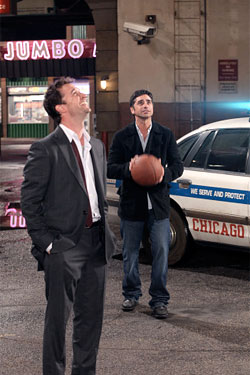
Like most people, you probably stopped watching ER years ago; maybe when Clooney left, maybe when Carter started spending all that time in Africa, maybe when Romano got killed by the same helicopter that had chopped off his arm a year earlier (I wish I were making that up). But as you may have heard, the series drew to a close last night after fifteen years, and while it was emotionally satisfying, it won’t go down in history among the great series finales.
Old viewers just returning were in luck: Newer characters’ stories were wrapped up in the last few weeks, so we could nostalgically welcome back former favorites. The first few years of the series were seen through the eyes of John Carter, trust-fund medical student. In (too) many subsequent seasons, “new” Carters were introduced, and so it was in the finale: Mark Greene’s now twenty-something daughter Rachel tours the hospital to see if she wants to do her residency there. (ER also has a history of bringing in talented new actors and then not quite knowing how to make them fit — Kellie Martin, Omar Epps, Jorja Fox, Sara Gilbert. Last night they inexplicably introduced The Gilmore Girls’ Alexis Bledel; she stands around with her gigantic blue eyes and looks really sad when patients die.)
Rachel’s visit, though, coincides with the long-delayed opening of Carter’s family-funded medical center, which results in a reunion of the long-missed Peter Benton, Susan Lewis, Kerry Weaver, and Elizabeth Corday. Carter takes Rachel Greene under his wing, doing for her what Mark Greene did for him as a student. It all sounds contrived, but deft acting and genuine affection for one another by the actors kept it from being maudlin or silly. But still, not enough was at stake: Many well-remembered storylines have long been resolved. That closing ‘Breathe Me’ montage from the finale of Six Feet Under would have taken the entire second hour of the show on ER; many farewells have already been said.
ER’s strength has always been the realistic practice of medicine by flawed (and heroic) human beings, and the finale avoided any of the over-the-top theatrics of some previous heavily-hyped episodes: There were no trains crashing into cars crashing into buses crashing into a fuel tank while an escaped prisoner played by Ewan McGregor menaces everyone. Instead, the focus was on the perhaps hackneyed, but still affecting, circle of life: Babies are born, old and young people die, some are healed and some are beyond hope.
Series finales tend to take a few well-worn routes, ending with a gotcha moment (Newhart, St. Elsewhere, Roseanne) or the old gang saying goodbye one last time, because everything’s changing (Mary Tyler Moore Show, MASH, Cheers). ER chose to follow the ‘life goes on’ model, which may be true to life but isn’t very memorable: a few touching interactions, a few jokes, and, in the waning moments, another major trauma rolled in and Dr. Carter and Dr. (Rachel) Greene taking their spots alongside the rest of the staff to do their jobs and try to save some lives. It was the only real way, if not a very dramatic one, to end such a sprawling show. And to answer your question, no, we don’t know whether Tony Soprano was whacked.

